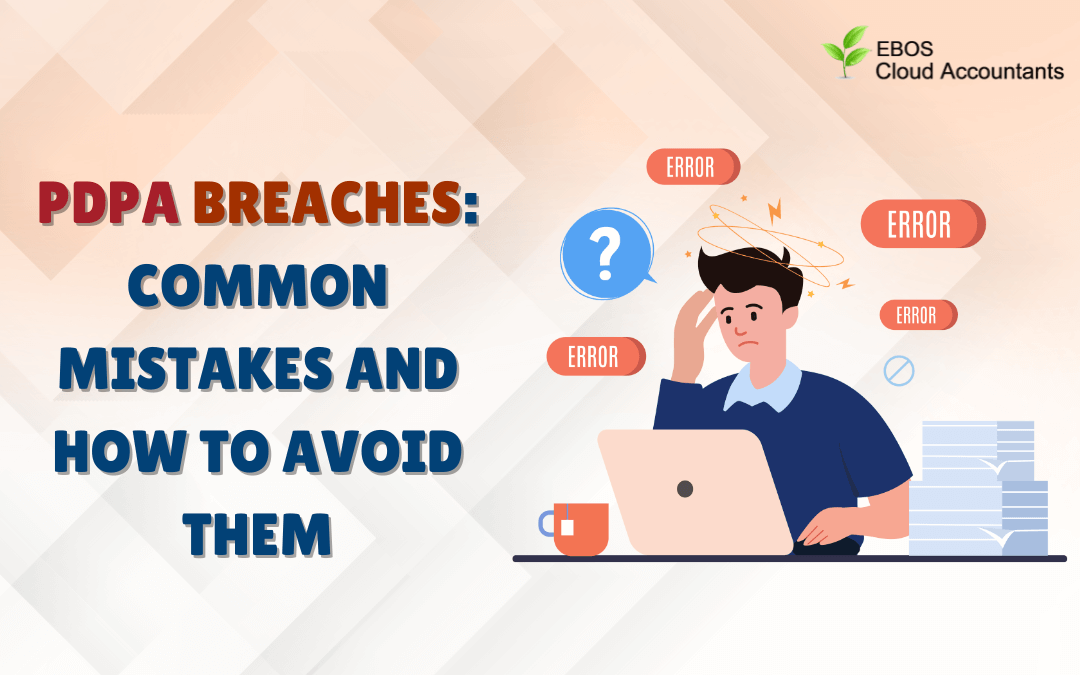Singapore’s Personal Data Protection Act (PDPA) establishes guidelines for how businesses must manage personal data to safeguard individuals’ privacy. Businesses need to stay alert as the digital transition quickens and data gains value to prevent security breaches that could lead to expensive fines, harm to their reputation, and erosion of customer confidence. Recognizing the typical errors that result in PDPA violations is the first step toward compliance and personal data protection. Let’s examine these errors more closely and learn how to avoid them.
Common Mistakes Leading to PDPA Breaches
- Insufficient Consent Management
- Mistake: One of the most frequent PDPA violations is the collection, use, or disclosure of personal data without first obtaining the people’ explicit and informed consent. Many companies erroneously believe that they can use the data for whatever reason after receiving approval.
- How to Avoid: Make sure the consent is specific to the intended use of the data and is obtained expressly. Adopt strong consent management procedures, including opt-in checkboxes, transparent consent forms, and consent recordings. Review and update consent forms on a regular basis to reflect any modifications to data usage.
- Poor Data Protection Measures
- Mistake: Personal data is exposed to breaches and unwanted access due to inadequate data protection measures, such as obsolete security software, weak passwords, and no encryption. Businesses frequently undervalue the significance of effective cybersecurity procedures.
- How to Avoid: Invest in intrusion detection systems, firewalls, antivirus software, and data encryption, among other complete cybersecurity measures. To find and fix vulnerabilities, do frequent security audits and assessments. Educate staff members on the value of creating secure passwords and how to spot phishing attempts.
- Inadequate Data Disposal Practices
- Mistake: Unintended data breaches can result from improper disposal of personal data, such as failing to properly destroy electronic files or destroying paper documents. Secure data disposal is something that many firms fail to consider, particularly when data is no longer required.
- How to Avoid: Establish a data retention policy that specifies the amount of time that personal information should be kept on file as well as safe disposal techniques. Utilize industry-approved data destruction equipment, and make sure that all physical documents are safely disposed of or shredded.
- Unauthorized Data Access
- Mistake: A major violation of the PDPA is granting unauthorized individuals access to personal data, regardless of the reason—inadequate monitoring or slack access controls. When workers have access to information beyond what is necessary for their jobs, this can happen.
- How to Avoid: Limit access to personal information to those employees who require it for their job functions in accordance with the principle of least privilege (PoLP). Establish role-based access controls, and make sure access rights are frequently reviewed and appropriate. To quickly identify and address any unwanted access attempts, use monitoring tools.
- Failure to Notify Affected Individuals and Authorities
- Mistake: A breach of the Personal Data Protection Act (PDPA) occurs when a company fails to quickly notify the affected individuals and the PDPC. Not all firms have a well-defined plan for handling incidents, which can cause delays in notifying customers of breaches.
- How to Avoid: Create a thorough data breach response strategy with procedures for locating, containing, and minimizing security breaches. Make sure the strategy specifies how to quickly notify the PDPC and the affected parties. Test and update the plan often to make sure it continues to work.
- Lack of Data Breach Preparedness
- Mistake: Many firms lack reaction plans and preventive measures, leaving them ill-prepared for data breaches. This may lead to insufficient mitigating attempts and a delayed response.
- How to Avoid: Create a team dedicated to responding to data breaches and hold frequent training sessions to get staff members ready for any security breaches. To find areas for improvement and to verify the efficacy of your breach response plan, run simulations and tabletop exercises.
- Non-compliance with Data Processing Obligations
- Mistake: Breach scenarios include failing to maintain data accuracy and not keeping data longer than necessary in accordance with the PDPA’s data processing obligations. Sometimes businesses neglect to put procedures in place for routinely reviewing and updating data.
- How to Avoid: Create and put into effect data processing policies that abide by the requirements of the PDPA. Make that all data is accurate and relevant on a regular basis, and remove those that are no longer required. Make sure all data processing operations are recorded and in line with the declared goals of the data collection.
- Lack of Employee Training and Awareness
- Mistake: Employee carelessness or ignorance may unintentionally result in data breaches if they are not aware of PDPA regulations or best practices for data protection. Companies frequently undervalue the need for continuous training for their staff.
- How to Avoid: All staff members should receive frequent training on PDPA compliance and best practices for data protection. Employ case studies and real-world examples to emphasize the significance of data security and the possible repercussions of non-compliance. Promote an awareness of data protection in the organization’s culture.
Conclusion
Businesses in Singapore need to put data protection first in order to comply with the PDPA and gain the trust of their clients in today’s data-driven world. Organizations can safeguard personal information, avert legal consequences, and preserve their good name by being aware of the typical errors that result in PDPA breaches and taking proactive steps to prevent them. To guarantee continuous compliance and protect personal data in a constantly changing digital environment, regular audits, employee training, and strong data management procedures are essential.
Check out our website at https://ebos-sg.com/ to explore more articles and discover how our Cloud Accountant Services can support you on your business.







